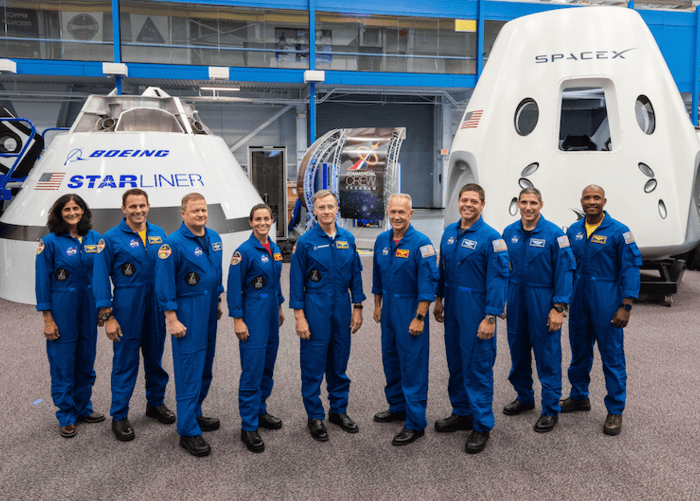HOUSTON — NASA on Friday announced the crews of the first flights from U.S. soil since the space shuttle retired in 2011, an elite group of astronauts that the agency hopes will help open a new era of space travel.
The crews would fly on spacecraft developed not by NASA but by two corporations, SpaceX and Boeing, which are under contract to provide a taxi-like service to the International Space Station.
The names of the NASA astronauts are: Robert Behnken, Eric Boe, John Cassada, Victor Glover, Michael Hopkins, Doug Hurley, Nicole Mann, Sunita Williams.
Leading up to the a ceremony at the Johnson Space Center here, NASA Administrator Jim Bridenstine said it was a historic moment for the agency: “We are going to launch American astronauts from American soil. That’s a big deal.”
In 2014, Boeing and SpaceX were awarded a combined $6.8 billion in contracts from NASA to develop spacecraft capable of flying crews to the station, the orbiting laboratory.
But both companies have faced setbacks and delays, and on Thursday the agency announced additional schedule slips. While both companies had recently said they would conduct their first test flights with astronauts on board by the end of this year, those flights are now scheduled for 2019.
SpaceX said it would fly crews by April. Boeing said only that it would fly NASA’s astronauts by the middle of next year.
Last week, Boeing confirmed that it had a problem with its launch-abort system, which is designed to ferry crews to safety in the event of an emergency. In a call with reporters this week, John Mulholland, Boeing’s program manager, said that several of the valves failed to fully close, resulting in a propellant leak.
Boeing has since identified the problem, he said, and is working to fix it. “The result is that we’ll have a better and safer spacecraft,” he said.
SpaceX did not give a reason for the delay of its first crewed test flight. But it had been working to resolve an issue with its second stage that caused one of its Falcon 9 rockets to explode while it was being fueled ahead of an engine test.
“Safely and reliably flying commercial crew missions for NASA remains the highest priority for SpaceX,” Benji Reed, SpaceX’s director of crew mission management, said in a statement.
SpaceX, however, moved up the uncrewed test flight of its Dragon spacecraft from December to November of this year.
Since the shuttle was retired seven years ago, U.S. astronauts have had to fly on Russian rockets from a remote launch site in Kazakhstan.
In a recent report, the Government Accountability Office said that further delays in NASA’s “Commercial Crew” program could “disrupt access” to the space station, which would be an enormous embarrassment for NASA after investing about $100 billion to build and operate it.
The report warned that the companies’ schedules are “aggressive” and that they “have set ambitious — rather than realistic — dates, only to frequently delay them.”
Send questions/comments to the editors.



Success. Please wait for the page to reload. If the page does not reload within 5 seconds, please refresh the page.
Enter your email and password to access comments.
Hi, to comment on stories you must . This profile is in addition to your subscription and website login.
Already have a commenting profile? .
Invalid username/password.
Please check your email to confirm and complete your registration.
Only subscribers are eligible to post comments. Please subscribe or login first for digital access. Here’s why.
Use the form below to reset your password. When you've submitted your account email, we will send an email with a reset code.